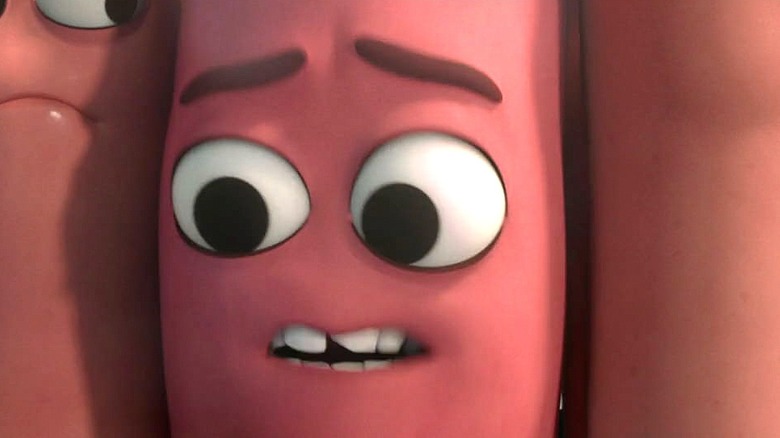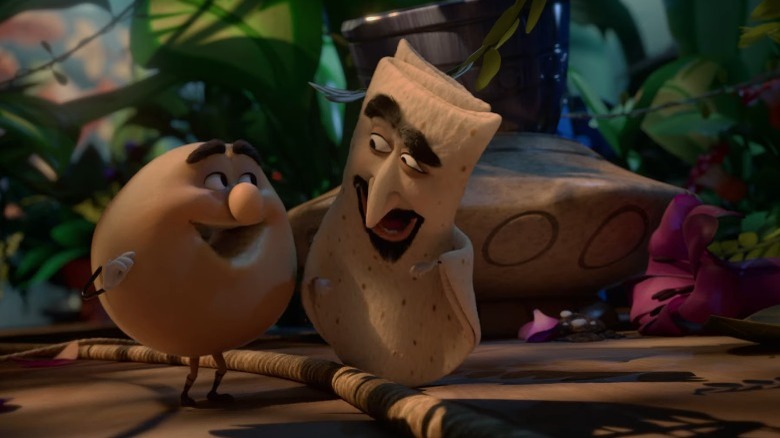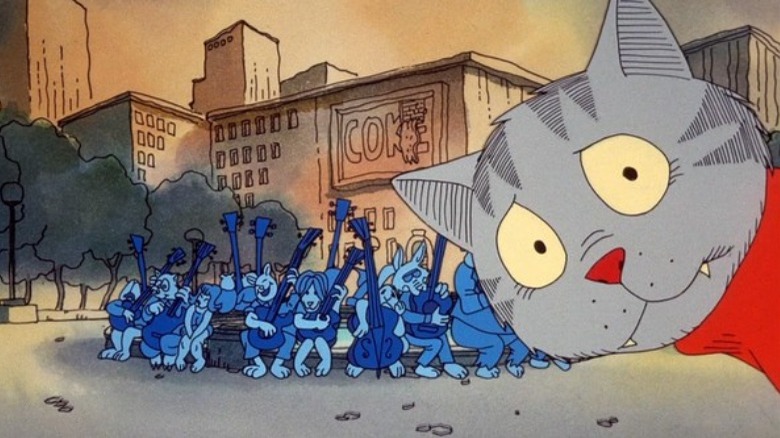What Sausage Party Had To Change To Remove Its NC-17 Rating
Did "Sausage Party" really happen, or was it just a collective hallucination? Granted, the very point of the 2016 Columbia Pictures comedy was to skewer the traditional tropes and limitations of good taste that we associate with CGI animated films. Directed by Conrad Vernon and Greg Tiernan, "Sausage Party" is a film built entirely to elicit knowing humor from shock and absurdity. Its very plot, concerning a group of grocery store products who idealize the "Great Beyond" to which they will go upon being purchased, only to accidentally learn the gruesome, violent truth of what happens to them in humans' kitchens, is pointedly designed as a parody of the "anthropomorphic X" formula several beloved Pixar and Disney films rely upon. It's a movie that saw a golden opportunity to disconcert and took it.
But even so, what a deeply, disarmingly bizarre experience it was. And it is all the more bizarre that it became a massive box office success, grossing over $140 million worldwide against a $19 million budget (via Box Office Mojo). "Sausage Party" evidently scratched some sort of societal itch; deep down, a lot of audience members must have been curious to see what a CGI animated comedy might look like if liberated from any and all obligation to be family-friendly. But in order to achieve that kind of financial triumph, the filmmakers had to make one key adjustment to keep the film rated R, as the MPAA originally intended to give it the dreaded NC-17.
The MPAA asked for a little more manscaping
It's not surprising that a movie as obscene as "Sausage Party" had trouble with the infamously cagey MPAA. If anything, the ratings association went surprisingly light on the adult animated flick, according to writer and producer Seth Rogen, who played the male lead — an anthropomorphic sausage who is aptly named Frank.
In a 2016 interview with Howard Stern on his radio show, Rogen revealed that he and the team knew exactly what they were getting into, ratings-wise, when they set out to make "Sausage Party." "Our fear was that it would then create this big negotiation process where we ultimately had to butcher the f***ing thing, you know?" he told Stern. The film's climactic graphic orgy between supermarket products seemed like a particularly tough sequence to get away with in R-rated territory, so it was purposefully packed with extreme vulgarity in order to still remain plenty bawdy should it get sanded down. "We probably added six things into the orgy that we were like, 'OK, these are like our sacrificial lambs,'" Rogen told Stern.
To everyone's surprise, the MPAA was fine with the entire sequence, and indeed the entire film, save for one specific detail. At one point in the orgy, Sammy Bagel Jr. (Edward Norton) pulls down the scrotum of Kareem Abdul Lavash (David Krumholtz), the pita bread. Take out the scene? Obscure the scrotum? No: the MPAA merely asked that Lavash's pubic hair be removed. And so, per Rogen, they "digitally shaved the pita bread's b***sack." And the R rating was granted.
Sausage Party is not the first animated film to have struggled with the ratings board
Part of the novelty of "Sausage Party" was that it was animated in CGI, a style traditionally associated with big-budget studio filmmaking, and, by extension, family-oriented content. Indeed, even with a "safe" rating, the film was the first CGI animated film to be rated R in the MPAA's history (via CBC).
But it was not, in fact, the first time that an animated film spurred such ratings controversy. Back in 1999, "South Park: Bigger, Longer & Uncut" also made headlines for its tussle with the MPAA. The theatrical "South Park" film was submitted six times and got an NC-17 in each instance — until executive producer Scott Rudin stepped in and strong-armed the MPAA into relenting (via Birth Movies Death). Five years later, Trey Parker and Matt Stone once again found themselves in a pickle when the MPAA objected to the puppet sex scene in "Team America: World Police," which went through a total of 10 recuts before being approved for an R rating (via Entertainment Weekly).
Even before the NC-17 classification existed, legendary animator Ralph Bakshi was already stirring up trouble with adult-oriented '70s films like "Heavy Traffic" and "Fritz the Cat," which shocked the MPAA enough to receive X ratings. The latter film even made that an advertising point, including the tagline "We're not rated X for nothin', baby!" and playing up the novelty of an X-rated animated film on its theatrical release poster.


